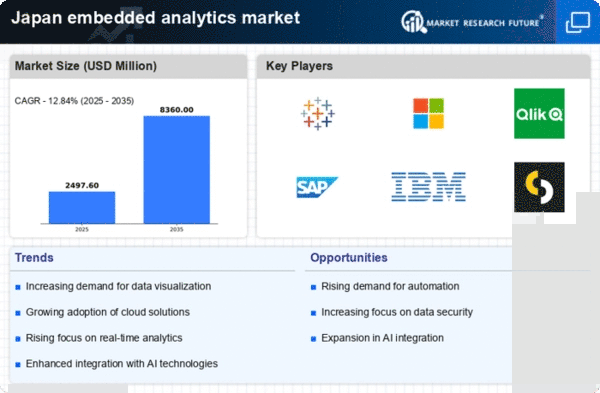Increased Focus on Customer Experience
In Japan, the embedded analytics market is being propelled by an increased focus on customer experience. Businesses are increasingly aware that providing personalized and data-driven experiences can significantly enhance customer satisfaction and loyalty. By embedding analytics into customer-facing applications, organizations can gain insights into customer behavior and preferences, allowing for tailored offerings. This shift is reflected in the growing investment in analytics solutions, with companies allocating around 20% of their IT budgets to analytics initiatives. As customer expectations continue to evolve, the embedded analytics market is likely to expand, as organizations strive to meet these demands through enhanced data utilization.
Growing Adoption of Cloud-Based Solutions
The shift towards cloud-based solutions is significantly impacting the embedded analytics market in Japan. Organizations are increasingly migrating their analytics capabilities to the cloud, driven by the need for scalability, flexibility, and cost-effectiveness. Cloud-based embedded analytics solutions allow businesses to access real-time data and insights from anywhere, facilitating better decision-making processes. This trend is reflected in the market, with cloud-based analytics expected to account for over 50% of the total market share by 2027. As more companies recognize the benefits of cloud technology, the embedded analytics market is likely to experience accelerated growth, fostering innovation and enhancing overall business performance.
Regulatory Compliance and Data Governance
Regulatory compliance and data governance are becoming critical drivers for the embedded analytics market in Japan. As data privacy regulations tighten, organizations are compelled to adopt analytics solutions that ensure compliance while providing valuable insights. The embedded analytics market is witnessing a rise in demand for tools that facilitate data governance, enabling businesses to manage data responsibly and transparently. This trend is particularly relevant in sectors such as finance and healthcare, where compliance is paramount. The market is expected to grow as organizations prioritize solutions that not only enhance analytics capabilities but also adhere to regulatory standards, potentially increasing market value by 10% over the next few years.
Rising Demand for Data-Driven Decision Making
The embedded analytics market in Japan is experiencing a notable surge due to the increasing demand for data-driven decision making across various sectors. Organizations are recognizing the value of integrating analytics directly into their business applications, which allows for real-time insights and informed choices. According to recent estimates, the market is projected to grow at a CAGR of approximately 15% over the next five years. This growth is largely driven by the need for businesses to enhance operational efficiency and improve customer experiences. As companies strive to remain competitive, the embedded analytics market is becoming essential for their strategic initiatives, enabling effective data leverage and competitive advantage.
Technological Advancements in Analytics Tools
Technological advancements are significantly influencing the embedded analytics market in Japan. Innovations in cloud computing, big data technologies, and data visualization tools are enhancing the capabilities of embedded analytics solutions. These advancements allow organizations to process vast amounts of data quickly and efficiently, leading to more accurate insights. The integration of advanced analytics tools into existing systems is becoming increasingly common, as businesses seek to streamline operations and improve decision-making processes. As a result, the embedded analytics market is expected to witness substantial growth, with a projected increase in market size reaching approximately $1 billion by 2026. This trend indicates a strong inclination towards adopting sophisticated analytics solutions.
















